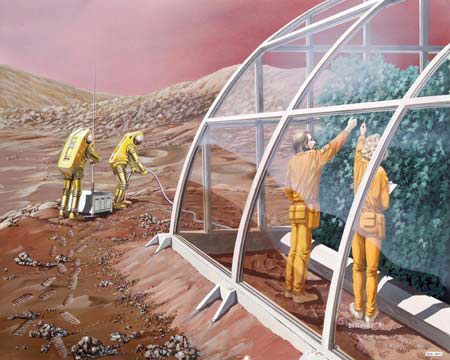Humans, as we know them, will not persist.
That’s not to say we’ll certainly meet with some sort of extinction event, even if that’s a very plausible scenario sooner or later. It does, however, mean speciation will likely occur whether as a result of our commandeering of evolution through biotechnology or via the establishment of space settlements in environments far different from the one that sustains us.
If you read this site with any regularity, you know my opinion that sending humans to Mars in the near- or medium-term is needless and crazy. Doing so within the next decade as Elon Musk plans to seems particularly foolhardy. Reusable rockets carrying robots to do reconnaissance and infrastructure-building for the foreseeable future seems wiser. But billionaires get a bigger vote than the rest of us, so off we (probably) go.
In “The Martians Are Coming–and They’re Human,” an excellent Nautilus essay, Scott Solomon analyzes how Mars would remake Homo sapiens, explaining why perhaps that planet’s pioneers will develop orange skin, why sex between Martians and Earthlings will be verboten, etc. An excerpt:
Take this all together—no sex between Earthlings and Martians, founder effects, changes to the microbiome, natural selection in the harsh Martian environment, and low gravity—and the message is clear: Settling Mars could eventually lead to the evolution of an entirely new human species. This happens routinely to animals and plants isolated on islands—think of Darwin’s famous finches. But while speciation on islands can take thousands of years, the accelerated mutation rate on Mars and the stark contrasts between conditions on Mars and Earth, would likely speed up the process. In just a few hundred generations—perhaps as little as 6,000 years—a new type of human might emerge.
In 1950, Ray Bradbury published a series of linked short stories called “The Martian Chronicles” that imagined a distant future in which Mars had been long ago colonized by humans, who have subsequently lost all interest in and connection to Earth. The Martians have brown skin and yellow eyes. “Do you ever wonder if—well, if there are people living on the third planet?” asks one Martian. “The third planet is incapable of supporting life,” states her husband. “Our scientists have said there’s far too much oxygen in their atmosphere.”
Bradbury’s fiction may well prove prescient. Should some disaster occur on Earth, colonizing Mars might be necessary for our long-term survival. Yet the strategy meant to preserve our species might ultimately change us forever.•
Tags: Scott Solomon

